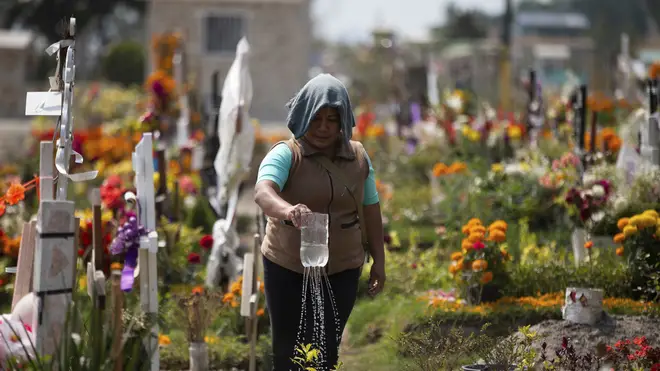
Tom Swarbrick 4pm - 6pm
30 October 2020, 07:54

Many Mexicans will be unable to visit cemeteries where it is traditional to decorate family graves.
Mexico’s Day of the Dead celebration this weekend will not be the same in a year so marked by death, in a country where more than 90,000 people have died of Covid-19.
Many of those had to be cremated rather than buried, and even for those with gravesides to visit, the pandemic has forced authorities in most parts of Mexico to close cemeteries to prevent the traditional November 1-2 observances when entire families clean and decorate tombs, cover them with orange marigolds, light candles and chat with their deceased relatives, perhaps over a glass of their favourite beverage.
On Sunday, many residents of the impoverished suburb of Valle de Chalco, east of Mexico City, visited a recently opened overflow section of the local cemetery to clean the simple graves of their loved ones, many still just marked by dirt mounds, because they had heard the graveyards would be closed on the actual holiday.
“A lot of people came to fix up their (relatives’) graves before the Day of the Dead,” said Jose Juan Rivera Almazan, the cemetery manager.

He noted the new section of the graveyard “is filling up quickly. We do not know if that’s because of the disease”, though it is clear there is a steady trickle of new burials of Covid victims; they are easy to recognise because their coffins come wrapped in plastic.
This year, though, the cemetery will be quiet.
Jacinta Jimenez Viviano lost her husband, retired manual labourer Vicente Domínguez Alejo, to Covid-19 this year.
He died in the hospital, after almost no visits; Jacinta was occupied with her son, who also fell ill but recovered.
Her husband, a diabetic, was not so lucky.
Knowing she would not be able to come on November 2, when deceased adults are honoured, she brought flowers on Sunday to plant at her husband’s dusty grave.

She said the simple act of tending the grave was reassuring.
“I feel this represents hope that we will make it because, thank God, these days of the dead are very important to Mexicans,” Ms Jimenez Viviano said.
“We will leave a little offering for him now, and later, when we can, we will return.”
Mexico has long had a different attitude toward death, more social, more accepting than in many parts of the world.
Wakes and funerals here are often elaborate, days-long events gathering entire neighbourhoods and extended families for eating, praying and remembering.
But death amid the pandemic has become a very lonely affair; not only were wakes prohibited, many families could not be with their relatives in their final moments or even view the body because of coronavirus.

But in some ways, this year’s Dia de Muertos has also taken the holiday back to its roots and stripped away many of the cultural overlays and modern innovations that had begun influencing the celebration in recent years.
Gone is the Hollywood-style Day of the Dead parade that Mexico City adopted to mimic a fictitious march in the 2015 James Bond movie Spectre.
Halloween, with its more risky, group activities, costume parties and trick-or-treating, has retreated in the face of the pandemic.
In many ways, it has boiled down to the way the holiday began: simple altars to invite the dead to come home for a night, featuring candles to guide the spirits back and the favourite food and drink of the dead to lure them home.

Held inside homes, this is one of the few safe activities, though there are some attempts at online celebrations too.
“This year, the Day of the Dead must be celebrated virtually,” said Mexico City cultural secretary Jose Alfonso Suarez del Real, inviting city residents to post photos or videos of their altars on a city website.
“It is fundamental that we recover and adopt once again the altars to our dead, which are household altars.”